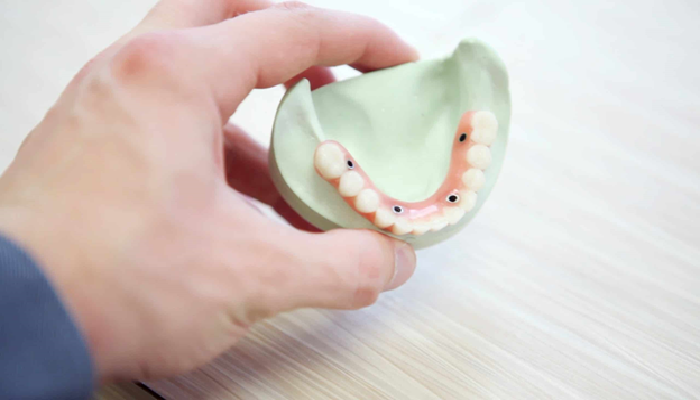Why your Dentures Cause you to Have a Gag Reflex

Gag reflexes are a natural response of the body to sensitivity in the windpipe. This can be triggered due to the passage of food at a fast pace down the throat or simply due to a spasm that causes contraction in the windpipe like when you are about to throw up at the site of a dirty diaper. But for most people with a small mouth, it could be more common to experience gagging especially when they rush their meals. If you have experienced a toddler having their meals, you will agree that the size of the oral cavity does influence how often you get a gag reflex.
In a more natural setting, it may not all be as a result of the size of the mouth as in the case of mental triggers that promotes retching. Think back to staring at a messy diaper or a rottening bin filled with maggots, you surely will get the sense of an irritation that will surely trigger your oral cavities. It could be worse for people with a narrow palate.
But while a gag reflex is not a big deal if it is a natural occurrence that takes place occasionally when stimulated, you surely want to look into dental procedures that can help minimize it if you suffer from a sensitive oral cavity. Concerned about fixing your smile? This page here has more about cosmetic dental procedures to fix your smile.
Understanding Gagging: When should you be Worried
Most people won’t need to worry if they happen to experience this when stimulated by a physical response. Take your mind back to the bin filled with maggots, and if this is how you get the gag reflex response, it may be safe to say you should avoid staring at a maggot-infested bin. You want to know how the gag reflex works and when you should be worried and seek medical assistance.
For starters, gagging takes place at the back of the mouth and is brought about by the narrowing of the oral cavity specifically the throat. That is why you always get the feeling of throwing up or even throwing up when you are retched. The back of the mouth is divided into different sections that all play a role in helping you to breathe properly and swallow food.
Kids under the age of four with an oral cavity that has fully developed normally breathe even with food in their mouth. This is why when feeding a newborn, you need to continuously force the meal into the mouth with the help of a spoon. This reverts to normal once they begin to grow and their organs increase in size.
You will need to be more worried if you happen to have a small mouth or are missing more than one tooth and need help with a dental procedure to improve your ability to swallow. In this case, you may want to speak with your dentist about dentures and gag reflexes and how best to improve your narrow oral cavity. This link https://www.healthline.com/health/narrow-palate has more on narrow palate symptoms and how to fix them.
Gagging and Sensitivity: Common Response to Lookout For

It is normal to feel retched due to a physical response brought about by sight like when staring at the maggot-infested bin. And some adults don’t even have to worry about them when faced with a disgusting sight. But there is no denying that there are symptoms to look out for that could very well mean that you have issues with your oral cavity.
An incomplete set of dentitions will only mean that you have to do more work when it comes to swallowing your meals. It will also be an issue for someone with a small mouth like in the case of toddlers. It is also common to gag when you visit dentists. This could be as a response to techniques used to examine the inside of the mouth.
In this case, this can be due to triggers by the brain as a stimuli response which will increase the production of saliva, cause you to vomit, or increase the signals to the heart causing you to palpitate. Some of the common symptoms of gagging include
- Production of excess saliva
- Tears in the eyes
- Sweating
- Fainting
- Experiencing a panic attack
All these are some of the symptoms you will notice when you are having an issue with your gag reflex. But some conditions can trigger retching or have you noticed a closure in your throat. Common conditions that can cause this include
- An obstruction in the nose
- If you are a heavy smoker
- As a result of a gastrointestinal disorder
- If you have dentures that don’t fit properly
- An abnormally shaped palate
Dentures and Gag Reflex

While swallowing a pill will surely have your retching, people with dentures also happen to gag more than usual. And this is not a strange occurrence, as it could only be normal with a foreign object in the mouth. With dentures and gag reflex, will surely experience the phenomenon since a denture is not something you are comfortable with naturally. This is even more common when you use them for the first time. The materials your dentures are made of are not similar to the ones that make up your natural dentition and as such will trigger your oral cavity.
While your gag reflex will be stimulated when you are swallowing too much food, or irritated due to the action of brains signals from touch and sight stimulus, you could be finding yourself gagging with dentures on. The best thing you can do is to maintain proper care of your dentition daily and ensure that you get a professional solution when you need to fit dentures.
You will need to go for a flexible option whether you choose complete or partial dentures depending on if you are missing one, more, or all of your teeth. This allows them to be designed to fit the size of your mouth which will allow complete movement. They are also more comfortable to insert and will reduce closing of the throat when you try to have them inserted.
Final Note
There is nothing to worry about a gag reflex as it is a natural response that is common in all humans. But it could be more frequent in some people especially those who have a small mouth or make use of dentures. Heavy smoking, a gastrointestinal disorder, or an obstruction in the nose could also cause you to retch more often at the slightest irritation. There are ways to treat gagging even if you happen to use dentures and will need to check with your dentist for professional assistance.
